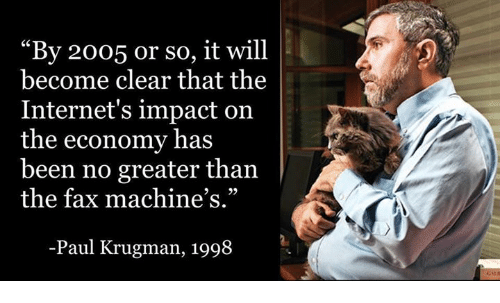College Doesn't Sell You "An Education"
Is college worth it? What do you mean by “it”? I’m serious. Is “it” the four-year-long quasi-luxury resort lifestyle? Is “it” the information you get as a result of your 120 credit hours? Is “it” the friends you make along the way? Is “it” the alumni network? Is “it” the status & credentials?
If your “it” = “education” or “information” or “knowledge”.
The answer is fuck no. At least, in my not-so-humble opinion.
“You wasted $150,000 on an education you coulda got for $1.50 in late fees at the public library.”
Take out all the other “component products” that are bundled into the product of higher education.
Because that’s precisely what a college experience is, it’s a bundle of smaller products. A town to call home for four years, access to a peer group, an alumni network you can tap into post-graduation, etc.
“Only two ways to make money in business: One is to bundle; the other is unbundle.”
– Jim Barksdale
In terms of the “education” or “information” or “knowledge”, they sell you – it’s low quality by nature. It can’t compete with free market teachers. They need to package that component with other offerings.
** Caveats Inserted Here**
My criticism is not reserved for EVERY college education. Examples of fruitful college experiences still exist and are plentiful. If your aim is to become a nurse, doctor, or physician assistant, the traditional route still pencils out. Same with the legal industry and several other career paths. I don’t want my brain surgeon to get their certification from YouTube.
The “education” I’m attacking is for the nonmedical, legal, or STEM-based degrees.
The Communication, Business, Public Relations, Marketing, English, and alike degrees. If these degrees were a live event, they would be the Fyre Festival.
Due to market forces/alternative, mainly the internet, the information being taught at colleges for the aforementioned subjects are structurally deficient. That’s one of the factors that led me to join Bloomtech.
They are and will forever be unable to compete with free market teachers.
Exploring “Education & Information” Products
Below is an exploration of the characteristics of education provided to you by traditional college professors and free-market teachers. A valuable exercise when exploring the question “is college worth it”?
The Law Of Supply And Demand
“While the business model for distributing facts and truth dies out, the model for distributing opinions and signaling goods is booming.”
– Naval Ravikant
You can’t escape foundational economic principles like supply and demand, even if you are as delusional as this guy:

Information has been 100% commoditized. The supply is no longer scarce. It is as abundant as unsolicited dick pics. College is a business. Businesses sell products. Colleges’ main products were knowledge and information, but now can’t be because the information is no longer scarce, it’s no longer guarded or expensive to produce. Colleges’ main product is credentials.
Open Market Teachers Vs. Insulated Professors
The information you are likely to receive from college textbooks and professors, by their nature, can’t compete with information from free-market teachers. Firstly, the number of free-market teachers is next to infinite. If you have internet access, your choice of educators just went from 10-100 professors to anyone that produces content on the internet.
This was the equivalent of allowing black people to compete in professional sports. The competition pool got a bit larger, and a fuck-ton more competitive.
The two other main reasons are feedback loops and incentives.
“I think it’s very important to have a feedback loop, where you’re constantly thinking about what you’ve done and how you could be doing it better.”
– Elon Musk
Content produced on the internet, by actual practitioners and builders, has a feedback loop that allows the information and teacher to grow more intelligent and relevant to their students. At scale, with data-filled dashboards, and at the speed of light, or at least internet packets.
Useless information or content that isn’t engaging obtains little to no interaction (shares, likes, comments) while information that serves your audience gets the honest reward signals (backlinks, traffic, likes, shares, retweets, etc.).
Yes, professors can garner feedback from students, but it is slow, sometimes manual, limited to their small classroom size, and they don’t have direct incentives to implement it.
Marketplace teachers have all the incentives to perform. They don’t have a captive audience i.e. students that are forced to buy their textbooks. If they don’t teach their audience anything material, they will cease to have one.
“Show me the incentive, and I will show you the outcome”
The standard professor, on the other hand, can pontificate from the front of a classroom, take in zero feedback from students, and their audience, income, and job title remain the same.
Furthermore, due to the tenure system, they have zero incentives to improve their material. They have risks if they change it and little to no rewards.
They can teach you that creating trillions of dollars out of thin air and debasing the monetary supply is a good thing without repercussions.
Mass Production vs. Customized Approaches
The current educational model was built to mass-produce students. Its structure was literally mirrored and inspired by Ford’s Model-T factories. 18-year-old High School student in credentialed 22-year-old College Graduate out. Student after student, or unit after unit, just like the automobile.
This can be optimal for cars — but certainly isn’t for humans. By design, this mass-production style of education is inherently flawed and less effective than other models.
Every student has preferences and varying capacity to learn through different mediums and different sources. Books vs. podcasts. Storytelling vs. buckets of statistics. Playing games vs. essay writing. Is college worth it, when you’re perfect teacher can be found online for free, in the perfect personal medium?
Niche Information + Niche Analogies + Contemporary Content = Better Learning
Humans learn through analogy. Software Engineers can learn cooking, or weight lifting quicker if their teachers use computer science references. Football players can absorb the history of WWII if they are taught through analogies of the sport they love.
The internet allows for Infinite amounts of teachers, teaching through all kinds of metaphors and analogies, allowing for students to pick their most effective & personal teachers. A professor at Harvard may have the most internalized knowledge about marketing, but can they teach it better to a student, who loves sports and social media, better than Gary Vaynerchuk?
Yes, some colleges have great practitioners, who are great teachers and have created great work like John McFee from Princeton. But be honest with yourself, who would you rather want to learn how to write a book from, him or Tim Ferriss?
John may be better at the craft of writing but can he really compete with Tim on launching businesses, branding, networking, and all the other 13 other things Tim does when he writes books in this media environment? Oh, and you don’t have to pay $57,410 in tuition to learn from Tim, 100% of his teachings are free online on his website.
Impactful Vs. “Impressive” Information
Is the point of English class to write so well so you get invited to the Upper-east-side cocktail parties with the staff of the NY Times or is the ultimate goal of writing to sell books, market products, increase personal authority, and/or open career opportunities, and increase your income?
Writing can lead to landing your dream job due to a kickass cover letter, can lead to closing your biggest sale due to a persuasive email, or can lead to a new friend online because of a great Tweetstorm. But that isn’t the kind of writing they are teaching in “higher education”. That’s because colleges have this history of aiming to educate for “impressiveness”, not impactfulness. To reiterate the Naval Ravikant earlier, facts as a core product offering are a thing of the past, so these companies will continue to sell you on the status and “high value” opinions instead of practical knowledge.
Ask yourself, what are the actual GOALS of this “high-value information” or “higher education?. Is it to increase lifetime earnings, open doors for higher quality professional relationships, and publically prove your expertise in a subject, or is it to signal high status to “the right” group of people?
One last question in regards to the product offering of information. Are we being taught the material that actually matters? Set aside the material that increases earning potential, the career-specific stuff.
What about the information that helps you solve the problems that every American adult faces? How much time do traditional colleges spend on teaching personal finance, navigating health insurance options, building online audiences, nutrition, dating, mental health, or tax filings? The answer is no time. There is little to no effort on educating you in the most impactful areas of your life.
So, Is College Worth It?
College is not worth the information you receive. Full stop. Now, is it worth the collegiate athletic opportunities, freedom to choose directions and hobbies fully for four years, and all the other intangible product offerings? That’s a whole different discussion, one I won’t touch on in this blog post.
But due to its free-market competition, the information you receive inside of a lecture hall from an insulated professor isn’t worth the price tag – especially when you consider that most of their competition is literally free online.
Is college worth it? Wait, better question, is college worth “it”? Once you define your interpretation of it, you’ll be better positioned to answer the actual question.
